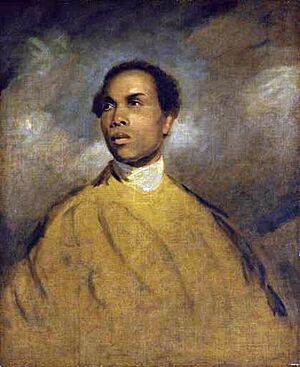Francis Barber facts for kids
Francis Barber (born around 1742 or 1743 – died January 13, 1801) was a manservant from Jamaica. He worked for the famous writer Samuel Johnson in London from 1752 until Johnson's death in 1784. Johnson cared for Francis a lot. He left him money and books in his will. Johnson also wanted Francis to move to Lichfield, Staffordshire, his hometown. After Johnson died, Francis did move there. He opened a shop and married a local woman. Francis also helped Johnson with his famous Dictionary of the English Language and other writings. He was also a key person who told Johnson's friend, James Boswell, many stories about Johnson's life.
Biography
Early Life and Freedom
Francis Barber was born into slavery in Jamaica. He was born on a sugarcane farm owned by the Bathurst family. His first name was Quashey. This name was common for men from the Coromantee people.
When he was about 10 years old, Francis was brought to England by his owner, Colonel Richard Bathurst. The Colonel's son, also named Richard, was a close friend of Samuel Johnson. Francis was sent to school in Yorkshire. Johnson's wife, Elizabeth, died in 1752. This made Johnson very sad. Francis later told James Boswell how sad Johnson was. The Bathurst family sent Francis to Johnson to be his helper. He arrived two weeks after Johnson's wife died.
At this time, the rules about slavery in England were not clear. But when the elder Bathurst died two years later, he set Francis free in his will. He also left Francis a small amount of money. Samuel Johnson himself was strongly against slavery. He spoke out against it in England and in the American colonies.
After gaining his freedom, Francis worked for a chemist in Cheapside, London. But he stayed in touch with Johnson. Later, he joined the Royal Navy as a sailor. He served on different ships and was paid regularly. He saw the coast of Britain and learned to like tobacco.
Francis left the Navy on October 22, 1760. He then went back to London to work for Johnson again. We know about Francis's time in the Navy from James Boswell's book, Life of Johnson. Boswell wrote that Johnson was very worried when Francis joined the Navy. Johnson believed that being on a ship was like being in a jail. He said a person in jail had more room and better food.
A friend of Johnson's, Tobias Smollett, wrote a letter to John Wilkes to help Francis. Smollett explained that Francis was a "sickly lad" and not fit for Navy service. Wilkes, who was a kind gentleman, spoke to a Lord of the Admiralty. Because of this help, Francis Barber was released from the Navy. He returned to Johnson's service.
Later, Johnson sent Francis to school. Francis was in his early thirties then. Johnson wanted him to learn more so he could help him better. Johnson wrote letters to Francis while he was at school. He told Francis to "Be a good boy."
Later Years and Family
Francis Barber is mentioned often in James Boswell's Life of Johnson. There are also paintings that might be of him. Some art experts think a portrait at Dr Johnson's House was painted by James Northcote or Sir Joshua Reynolds. Sir Joshua Reynolds was one of the people Johnson trusted to manage Francis's money after his death.
When Johnson was writing his will, he asked his friend Sir John Hawkins how much money he should leave Francis. Sir John said a rich person would leave £50 a year. Johnson replied that he would be "noblissimus" (very noble) and leave him £70 a year. Hawkins did not agree with this. After Johnson died, he criticized Johnson for being too generous to Francis. Many newspapers wrote about the money Johnson left to Francis. Johnson actually left £750 in a trust for Francis.
Francis moved with his family to a rented house in Lichfield, Johnson's hometown. A newspaper reported that he spent his time "in fishing, cultivating a few potatoes, and a little reading." Later, he opened a small village school in nearby Burntwood. The money from his inheritance did not last. Francis sold some of Johnson's things to pay his debts. Some of Johnson's biographers did not approve of Francis marrying a white woman.
Francis died in Stafford on January 13, 1801. He had an operation that was not successful. He had a son, Samuel Barber, a daughter, Ann, and his wife, Elizabeth. Samuel became a Methodist preacher. Elizabeth and Ann started a small school. Both Samuel and Ann married white partners. Francis Barber's family still lives and farms near Lichfield today.
Legacy
Francis Barber appears as a character in the 2015 play Mr Foote's Other Leg.
A special plaque honoring Francis Barber was put up in 2016. It is on the railings of his and Johnson's old home at 17 Gough Square in London. This house is now Dr Johnson's House. Francis's great-great-great-great-grandson, Cedric Barber, helped to unveil the plaque.
 | May Edward Chinn |
 | Rebecca Cole |
 | Alexa Canady |
 | Dorothy Lavinia Brown |


